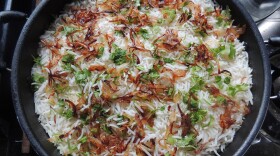
Eating the Past
Sundays from 12:01-12:06 p.m.
Eating the Past explores food and beverages in history along with our relationship to food today. The show ties in with a video series of the same name that features faculty and staff chefs who cook recipes from USU's historic cookbook collection. We will bring recipes, personal stories, interviews, and fun to the discussion of what we eat. The show will air every Sunday at noon before the Splendid Table.
This project has received funding from Utah Humanities.
-
This week all of the hosts celebrate the season by sharing some of their favorite seasonal spices.
-
Host Sarah Berry and her son Xander share a favorite holiday cookie recipe that comes from the Netherlands.
-
This week host Laura Gelfand continues the season's spice theme by considering cardamom. And she shares a Norwegian cookie recipe that her mom made every year during the holidays.
-
It's the season to cook apples! Host Tammy Proctor shares a spiced apple recipe that was a staple in her house growing up.
-
This week Evelyn Funda continues exploring the history of spices, herbs, and flavorings. Rather than focusing on our sense of taste she focuses on our sense of smell and the use of vanilla in perfumes.
-
Host Tammy Proctor continues her exploration of Armenian spices, including one of the herbs Dr. Michelle Tusan associates most with Armenian food.
-
This week Tammy Proctor continues this season's spicy theme exploring Armenian herbs and spices. She'll talk with Dr. Michelle Tusan from the University of Nevada, Las Vegas about her connection to this particular food way.
-
This week Jamie Sanders explores the spices and flavors that enliven our dishes, including vanilla and it's origins.
-
This week Evelyn Funda continues the theme of the cultural history of spices and how one particular spice's road to our kitchen cupboards has been long and twisted.
-
With the holidays around the corner Laura Gelfand continues this season's theme of spicy with an exploration into all things pumpkin!











